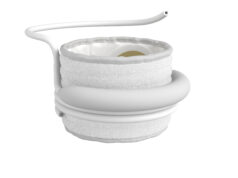
Researchers have developed ‘stem cell plasters’ which it is hoped will revolutionise the way surgeons treat children living with congenital heart disease and reduce the number of open-heart operations they may need.
Massimo Caputo (University of Bristol, Bristol, UK), has led the research, funded by the British Heart Foundation (BHF), to develop the first type of stem cell patch to repair abnormalities to the valve in the pulmonary artery, and to mend holes between the two main pumping chambers of the heart.
The stem cell plasters are designed to be sewn into the area of the child’s heart that needs repairing during surgery. The stem cells could then boost the repair of heart tissue without being rejected by the child’s body, Caputo and his team have claimed.
These patches have the potential to adapt and grow with the child’s heart as they get older, removing the need for repetitive heart surgeries and the many days at hospital recovering after each one.
The BHF has awarded Caputo nearly £750,000 with the aim to get these patches ready for testing in patients so clinical trials can start in the next two years, enabling more children and babies to benefit from the life-altering technology. The materials have already proven to work safely in animals.
The team is also in the early stages of developing other stem cell technologies using 3D bioprinting and gene therapy to one day be able to mend more complex congenital heart defects.
Caputo says: “For years families have come to us asking why their child needs to have heart surgery time and time again. Although each operation can be lifesaving, the experience can put an unbelievable amount of stress on the child and their parents. We believe that our stem cell patches will be the answer to solve these problems.
“Our ultimate vision in the next decade is to create a paradigm shift in the way doctors treat congenital heart disease, by developing personalised stem cell and genetically-engineered treatments for the most complex of heart defects.”
Sonya Babu-Narayan, associate medical director at the BHF, added: “If successful, this new stem cell therapy that acts like a healing plaster could revolutionise the results of heart surgery for children and adults living with congenital heart disease.
“It could offer a solution that means their heart is mended once and forever in a single operation, preventing people from facing a future of repeated surgeries and giving them the gift of a happier and healthier life.”










